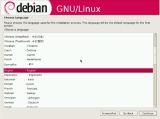
Debian-Installer
Encyclopedia
Debian-Installer is the installation program for Debian
. It was originally written for the Debian
3.1 release (codename: “sarge”), although the first
"release" version of a Linux distribution
it was used with was Skolelinux
Venus (1.0).
It is also one of two official installers available for Ubuntu
; the other being called Ubiquity
(itself based on parts of debian-installer) which was introduced in Ubuntu 6.06 (codename: "Dapper Drake").
It makes use of cdebconf (a reimplementation of debconf
in C
) to perform configuration at install time.
Originally, it only supported text-mode and ncurses
. A graphical front-end (using GTK+
-DirectFB
) was first introduced in Debian 4.0 (codename: “etch”). Since Debian 6.0 (codename: “Squeeze”), it uses Xorg instead of DirectFB.
Debian
Debian is a computer operating system composed of software packages released as free and open source software primarily under the GNU General Public License along with other free software licenses. Debian GNU/Linux, which includes the GNU OS tools and Linux kernel, is a popular and influential...
. It was originally written for the Debian
Debian
Debian is a computer operating system composed of software packages released as free and open source software primarily under the GNU General Public License along with other free software licenses. Debian GNU/Linux, which includes the GNU OS tools and Linux kernel, is a popular and influential...
3.1 release (codename: “sarge”), although the first
"release" version of a Linux distribution
Linux distribution
A Linux distribution is a member of the family of Unix-like operating systems built on top of the Linux kernel. Such distributions are operating systems including a large collection of software applications such as word processors, spreadsheets, media players, and database applications...
it was used with was Skolelinux
Skolelinux
Skolelinux is an operating system intended for educational use and based on Debian .Skolelinux is a free and open source software project founded in Norway, now supporting all languages present in Debian...
Venus (1.0).
It is also one of two official installers available for Ubuntu
Ubuntu (operating system)
Ubuntu is a computer operating system based on the Debian Linux distribution and distributed as free and open source software. It is named after the Southern African philosophy of Ubuntu...
; the other being called Ubiquity
Ubiquity (software)
Ubiquity is a simple Linux installer for Ubuntu and its derivatives. It runs on LiveCD and has a Qt frontend and a GTK+ frontend. Ubiquity was first introduced in Ubuntu 6.06 .-Features:* Internationalization support...
(itself based on parts of debian-installer) which was introduced in Ubuntu 6.06 (codename: "Dapper Drake").
It makes use of cdebconf (a reimplementation of debconf
Debconf (software package)
debconf is a software utility for performing system-wide configuration tasks on Unix-like operating systems. It is developed for the Debian GNU/Linux distribution, and is closely integrated with Debian's package management system, dpkg....
in C
C (programming language)
C is a general-purpose computer programming language developed between 1969 and 1973 by Dennis Ritchie at the Bell Telephone Laboratories for use with the Unix operating system....
) to perform configuration at install time.
Originally, it only supported text-mode and ncurses
Ncurses
ncurses is a programming library that provides an API which allows the programmer to write text user interfaces in a terminal-independent manner. It is a toolkit for developing "GUI-like" application software that runs under a terminal emulator...
. A graphical front-end (using GTK+
GTK+
GTK+ is a cross-platform widget toolkit for creating graphical user interfaces. It is licensed under the terms of the GNU LGPL, allowing both free and proprietary software to use it. It is one of the most popular toolkits for the X Window System, along with Qt.The name GTK+ originates from GTK;...
-DirectFB
DirectFB
DirectFB stands for Direct Frame Buffer. It is a software library for GNU/Linux/Unix-based operating systems with a small memory footprint that provides graphics acceleration, input device handling and abstraction layer, and integrated windowing system with support for translucent windows and...
) was first introduced in Debian 4.0 (codename: “etch”). Since Debian 6.0 (codename: “Squeeze”), it uses Xorg instead of DirectFB.

